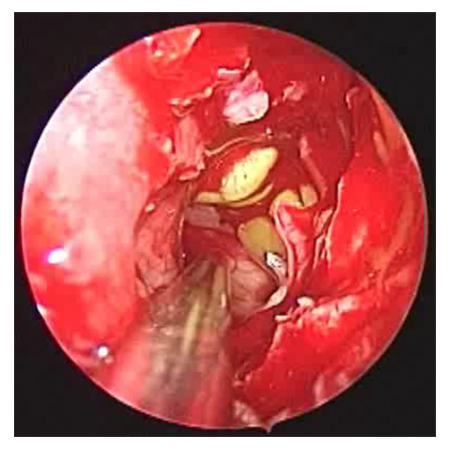Intrathecal Fluorescein for CSF Leak Detection
 J. Paul Radabaugh (former rhinology fellow at McGovern Medical School) presented the results of a retrospective study of intrathecal fluorescein (IF) use for detection of cerebrospinal fluid leaks (CSF) at the American Rhinology Society annual meeting in Los Angeles. The study included all patients who underwent endoscopic repair of suspected anterior skull base CSF leaks from July 1, 2008, through July 31, 2020, at a tertiary care institution in Houston. The final diagnosis is determined intraoperatively using endoscopic criteria. Martin J. Citardi, MD, professor and chair of the Department of Otorhinolaryngology at McGovern Medical School at UTHealth Houston was the senior author on the manuscript, which has been published in the International Forum of Allergy and Rhinology (10.1002/alr.22947).
J. Paul Radabaugh (former rhinology fellow at McGovern Medical School) presented the results of a retrospective study of intrathecal fluorescein (IF) use for detection of cerebrospinal fluid leaks (CSF) at the American Rhinology Society annual meeting in Los Angeles. The study included all patients who underwent endoscopic repair of suspected anterior skull base CSF leaks from July 1, 2008, through July 31, 2020, at a tertiary care institution in Houston. The final diagnosis is determined intraoperatively using endoscopic criteria. Martin J. Citardi, MD, professor and chair of the Department of Otorhinolaryngology at McGovern Medical School at UTHealth Houston was the senior author on the manuscript, which has been published in the International Forum of Allergy and Rhinology (10.1002/alr.22947).
“Our goal was to gain more information about the clinical utility of intrathecal fluorescein in endoscopic skull base repair,” Dr. Citardi says. “We rely on the use of fluorescein to confirm and localize CSF leaks and have to understand its limitations in terms of true positive, true negative, and false negative results.”
Of the 212 patients who underwent CSF leak repair of the anterior skull base, a total of 101 procedures involved administration of IF. The researchers calculated the sensitivity and specificity for the use of IF to accurately identify the site of the leak at 66.3% and 100%, respectively. The false negative rate was 33.6%. Patients who had a traumatic cause of CSF leak were nearly five times more likely to have a false negative result when using IF. Failure of leak repair was comparable between the two groups, and no IF-related complications occurred.
“Although endoscopic approaches have become the preferred method of repairing anterior skull base CSF leaks, and fluorescein is useful in diagnosis and therapy, its use remains controversial due to poorly characterized clinical scenarios,” Dr. Citardi says. “Our study has several limitations. The decision to use IF was surgeon-specific, and because this was a retrospective investigation, we relied on accurate documentation in patients’ medical records. In summary, we found that intrathecal fluorescein alone can’t exclude a CSF leak, especially following trauma. Surgeons who use IF during repair of traumatic skull base defects should be aware of the high false negative rate in these cases.”